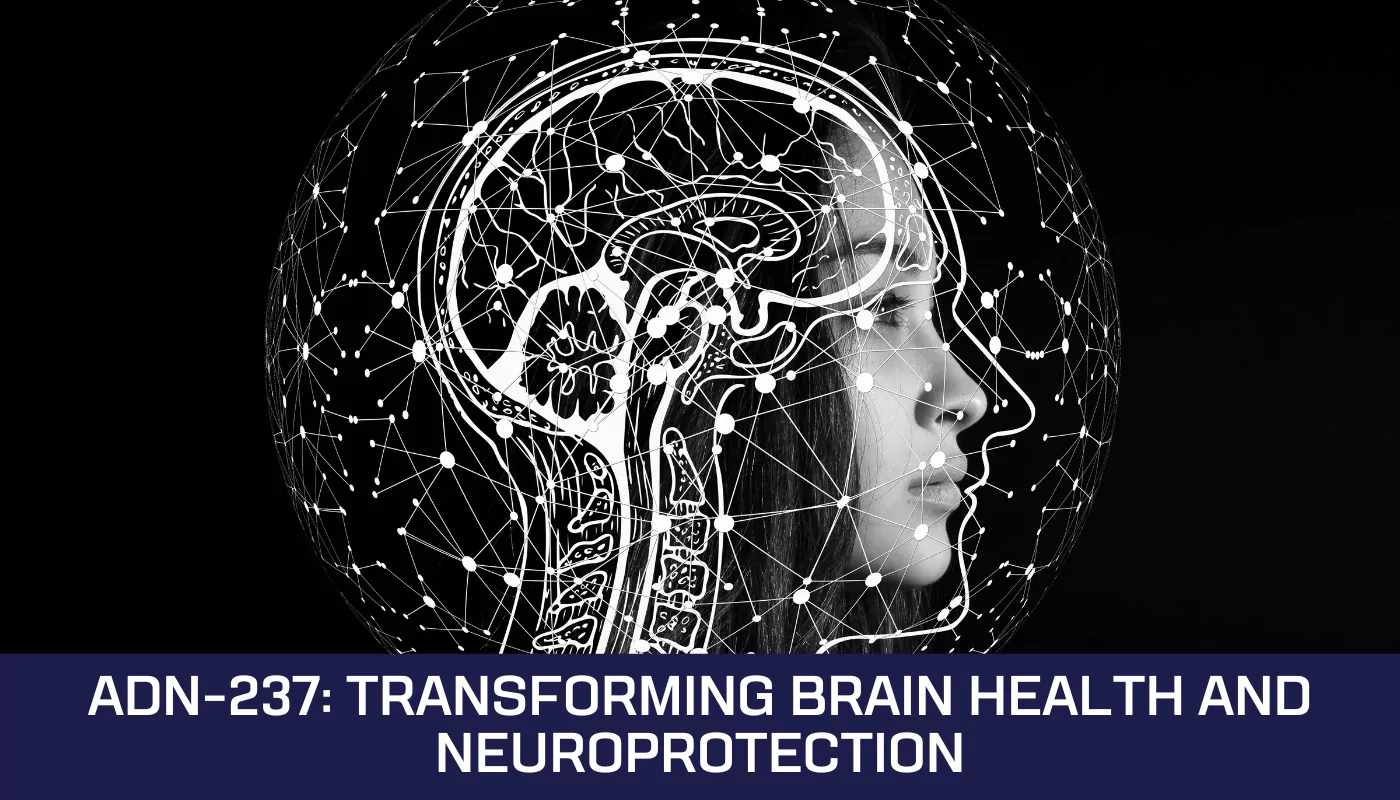Everyone wants a healthy brain. ADN-237 is a new hope for brain health. This article shows how it works and why it’s important. Keep reading to learn more about ADN-237!
Key Takeaways
- ADN-237 is a new drug tested to improve brain health and fight diseases like Alzheimer’s and Parkinson’s. It works by targeting brain pathways to boost thinking, memory, and protect nerve cells.
- Research on ADN-237 includes animal studies and plans for human trials. These studies focus on its safety, how well it works, and its effects on neurodegenerative disorders.
- Ethical concerns about ADN-237 involve access, affordability, and long-term effects. Regulations are key to making sure it is safe and effective before people can use it.
Exploring ADN-237

Let’s talk about ADN-237, a new player in the game of brain health. This drug steps into battle against brain aging and diseases, with science backing its moves.
What is ADN-237?
ADN-237 is a drug being tested to help brains stay healthy. It fights brain diseases and makes brain function better. This medicine is still in testing stages for improving how the brain works.
ADN-237 could change how we treat brain health, offering hope against diseases like Alzheimer’s and Parkinson’s.
How Does ADN-237 Work?
ADN-237 targets brain pathways that help with thinking and memory. It interacts with neural receptors to boost health in brain cells. This drug reduces neurodegeneration. It also lowers oxidative stress, which can harm neurons.
The mechanism of action helps protect nerve cells from damage. By promoting the release of a neurotrophic factor, ADN-237 supports cell survival and function. This is key for treating cognitive decline in diseases like Alzheimer’s and Parkinson’s disease.
Role of ADN-237 in Neuroprotection
ADN-237 plays a key role in protecting nerve cells. It helps fight diseases like Alzheimer’s and Parkinson’s, making it an essential tool for brain health.
How ADN-237 Protects Nerve Cells
ADN-237 protects nerve cells in several ways. It boosts the release of neurotrophic factors, which are vital for neuron survival and growth. This support helps maintain healthy nerves and promotes their repair.
Animal studies show that ADN-237 enhances neurotransmitter function. Better neurotransmission means improved communication between brain cells.
This drug also supports mitochondrial health, which is crucial for energy production in cells. Strong mitochondria lead to better cell function and survival rates. Overall, ADN-237 shows promise as a neuroprotective drug against issues like Alzheimer’s disease and Parkinson’s disease.
Use in Combatting Neurodegenerative Disorders
ADN-237 shows promise in fighting neurodegenerative disorders. Early studies suggest it may slow down Alzheimer’s disease progression. This drug could also delay motor and cognitive symptoms in Parkinson’s patients.
Research highlights its protective effects for those with Huntington’s disease, offering hope to many.
The role of ADN-237 in treating these diseases is crucial. It targets the nerve cells that often get damaged in conditions like Alzheimer’s and multiple sclerosis. By protecting nerve cells, this medication aims to improve brain health over time.
It stands out as a potential option among other medications for cognitive impairments and mental health issues related to neurodegeneration.
Enhancing Cognitive Abilities with ADN-237

ADN-237 helps boost brain function. It improves memory retention and cognitive skills, which can help with mental health challenges like Alzheimer’s.
How ADN-237 Improves Brain Function
ADN-237 boosts brain function by enhancing synaptic plasticity. This means it helps nerve cells communicate better. Improved communication can lead to better memory retention and learning skills.
Animal studies show that it also reduces neuroinflammation, which can harm the brain. These effects may help with cognitive health issues like Alzheimer’s disease and other neurodegenerative diseases.
Overall, ADN-237 shows promise for supporting mental health care and improving overall cognitive abilities.
Benefits for Cognitive Health Issues
ADN-237 may boost brain health. It supports mental wellness and enhances clarity. This drug could lower cognitive decline by fighting oxidative stress. ADN-237 also helps release brain-derived neurotrophic factor (BDNF), a key player in improving memory formation and overall brain function.
People with cognitive health issues might see real benefits from this treatment. Its anti-inflammatory properties can help reduce symptoms linked to neurological diseases, like lupus or rheumatoid arthritis.
Thus, ADN-237 shows promise for enhancing cognitive abilities while protecting nerve cells in the process.
Progress in Research and Development of ADN-237
Research on ADN-237 is moving forward quickly. Many studies are underway, testing its safety and benefits for brain health.
Ongoing Studies and Clinical Trials
Ongoing studies and clinical trials are key to understanding ADN-237. These efforts focus on its safety and effects.
- Animal Studies: Preliminary tests on animals show positive results. These studies help researchers learn about the potential benefits of ADN-237 in brain health.
- Human Trials: Human trials are coming soon. These are crucial for testing how ADN-237 affects people with early-stage neurodegenerative diseases.
- Safety Assessments: Clinical trials assess the safety profile of ADN-237. They look for any adverse effects or reactions in participants.
- Efficacy Evaluations: Trials also check if ADN-237 works as expected. Researchers want to know if it improves cognitive abilities and protects nerve cells.
- Phases of Trials: Ongoing studies include phase I trials now. These early stages help determine safe dosage levels and treatment plans.
- Collaboration with Pharmaceuticals: Partnerships with pharmaceutical companies support these studies. This collaboration expands resources and expertise in neuropharmacology.
- Monitoring Progress: Researchers continuously monitor the progress of clinical trials. This helps ensure patient compliance and accurate findings.
- Future Directions: Current trials guide future research directions for ADN-237’s use in treating autoimmune disorders too, expanding its potential market impact.
These ongoing efforts will shape how ADN-237 might change brain health treatments down the line.
Directions for Future Research
Future research on ADN-237 will focus on its effects over the long term. Current studies are just starting in clinical trials, so more data is needed. Researchers aim to find out how this drug candidate can help with neurodegenerative disorders and cognitive health issues.
Personalized medicine could play a big role here, allowing for customized doses based on individual needs. This approach may improve both bioavailability and efficacy.
More trials are essential to understand safety fully. Each trial can uncover new insights about how ADN-237 interacts with cellular receptors in the human brain. Advancements in pharmacogenomics might tailor treatments better, offering hope for patients needing alternative medicine solutions for their conditions.
The use of AI technologies and machine learning algorithms may also enhance future research efforts, leading to breakthroughs in neuroprotection and cognitive enhancement strategies.
Assessing Safety and Efficacy
ADN-237 shows promise in clinical tests. Recent findings point to its safety and effectiveness for brain health.
Findings from Clinical Trials
Clinical trials for ADN-237 show promise in safety and effectiveness. Preliminary studies indicate a favorable safety profile with mild side effects like headaches and fatigue reported by some participants.
Human trials are underway to further assess both safety and efficacy. Early data suggests that ADN-237 may improve cognitive function, based on findings from animal studies.
Researchers closely monitor the immune system responses of trial subjects. This helps identify how ADN-237 interacts with signaling pathways in the brain. The ongoing clinical trials focus on its role in neuroprotection and its potential benefits for cognitive health issues like neurodegenerative disorders.
Each step forward adds to understanding this innovative treatment option within biotechnology’s evolving landscape.
Overview of the Safety Profile
ADN-237 shows a favorable safety profile based on early studies. Mild side effects occurred, including headaches and stomach discomfort. These were minor and mostly temporary. In animal trials, only slight issues were noted.
Long-term safety will be assessed in future tests. Overall, initial findings suggest ADN-237 is safe for use.
Next, we’ll look at ethical concerns surrounding the usage of ADN-237.
Ethical and Regulatory Challenges
Ethical issues come up with ADN-237. Some worry about its use and effects on people. Regulations also add another layer of challenge. They shape how ADN-237 is studied and brought to market.
Ethical Concerns with Usage
ADN-237 raises ethical concerns. Access and affordability are big issues. Not everyone may get it, which could widen health gaps. Long-term effects of ADN-237 need careful study too.
The public is showing more interest in this treatment. Expectations must stay in check until clear evidence shows benefits and safety.
Navigating the Regulatory Landscape
Ethical concerns with ADN-237 lead us to important regulations. Regulatory approval is a major challenge. It requires clear evidence of benefits and safety before reaching patients.
Researchers must show how ADN-237 works effectively without risks.
Regulatory bodies analyze data from clinical trials carefully. Achieving clinical efficacy can take time and careful planning. Companies need to understand the rules for drug development well.
A strong focus on patient-centered care guides this process, ensuring that new treatments benefit those who need them most.
Prospects for ADN-237
ADN-237 shows great promise in brain health. Its effects on nerve cells could lead to new treatments for cognitive issues and neurodegenerative diseases.
Expected Impact on the Market
ADN-237 could change the market for brain health products. There is a growing demand for neuroprotective agents. If ADN-237 succeeds in clinical trials, its acceptance may rise quickly.
This could lead to new drugs that help prevent brain diseases. Pharmaceutical sectors might see significant growth with this product.
It can also impact precision medicine by targeting specific disorders. Advances in research like this show promise for treating issues like cognitive decline and neurodegenerative disorders.
The potential benefits of ADN-237 may attract investors looking at future uses in healthcare.
Predictions for Future Uses
ADN-237 shows promise in regenerative medicine and tissue repair. Its unique properties may help with nerve cell protection. This could impact industries like cancer treatment and pain management.
Personalized medicine might adjust dosing for individual needs, maximizing benefits.
With technological advancements, ADN-237 could enhance cognitive abilities too. It may play a key role in improving brain function and addressing health issues related to cognition.
The future looks bright for this compound as research continues to unfold new possibilities….
Conclusion
ADN-237 shows great promise for brain health. It may protect nerve cells and boost cognitive abilities. Ongoing research highlights its potential against diseases like Alzheimer’s and Parkinson’s.
As studies progress, this neuroprotective agent could change how we treat neurological decline. Exciting times lie ahead for brain health advancements!
FAQs
-
What is ADN-237 and how does it relate to brain health and neuroprotection?
ADN-237, a new player in the field of neuroscience, aims at transforming brain health and neuroprotection. It’s thought to bolster resilience against threats like infections or cancer cells by influencing immune responses.
-
How does ADN-237 work?
The specifics aren’t fully understood yet…but we know that ADN-237 may increase BDNF (Brain-Derived Neurotrophic Factor), which plays a role in the survival of neurons, preventing apoptosis—the death of cells.
-
Can artificial intelligence play any part in this process?
Absolutely! Artificial Intelligence can help understand pharmacokinetics—the way our bodies interact with drugs like ADN-237—and predict outcomes for better treatment planning.
-
Is there an analogy between cybersecurity and brain health protection?
There are parallels, yes! Just as intrusion detection systems detect anomalies or advanced persistent threats in cybersecurity—protecting against ransomware or other cybercriminal activities—we also need robust defences for our brains: think zero-trust but for your neurons!
-
Does a holistic approach matter when discussing brain health?
Definitely—it’s crucial! A holistic approach considers all factors impacting your brain’s wellbeing…like the community of microorganisms inside us—our microbial friends—that might affect everything from emotions to immunity.
-
Are there sustained-release options available for treatments like ADN-237?
Yes, sustained-release formulations could ensure steady levels of medication over time—much needed for long-term protection from diseases affecting the nervous system.

